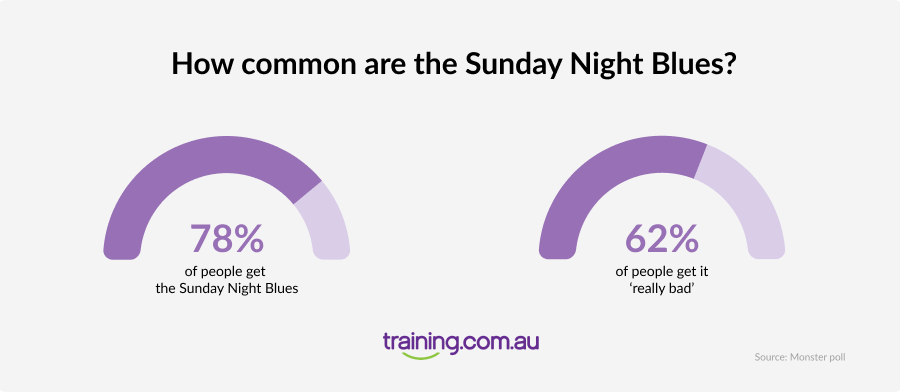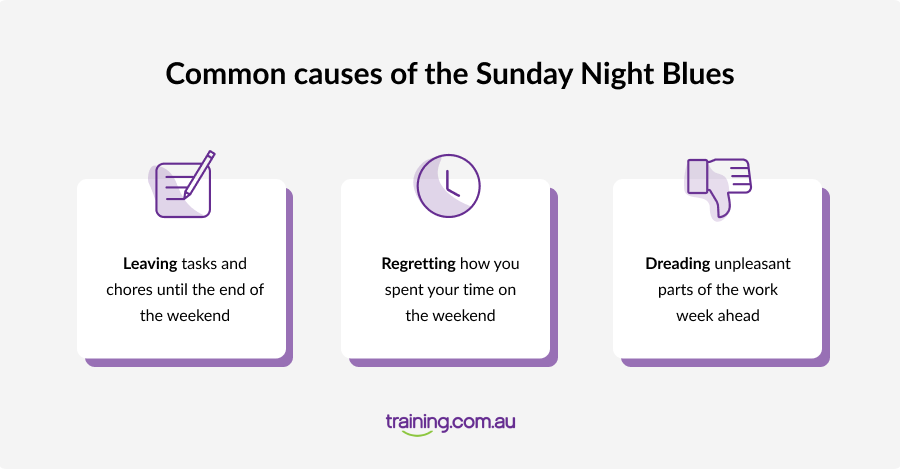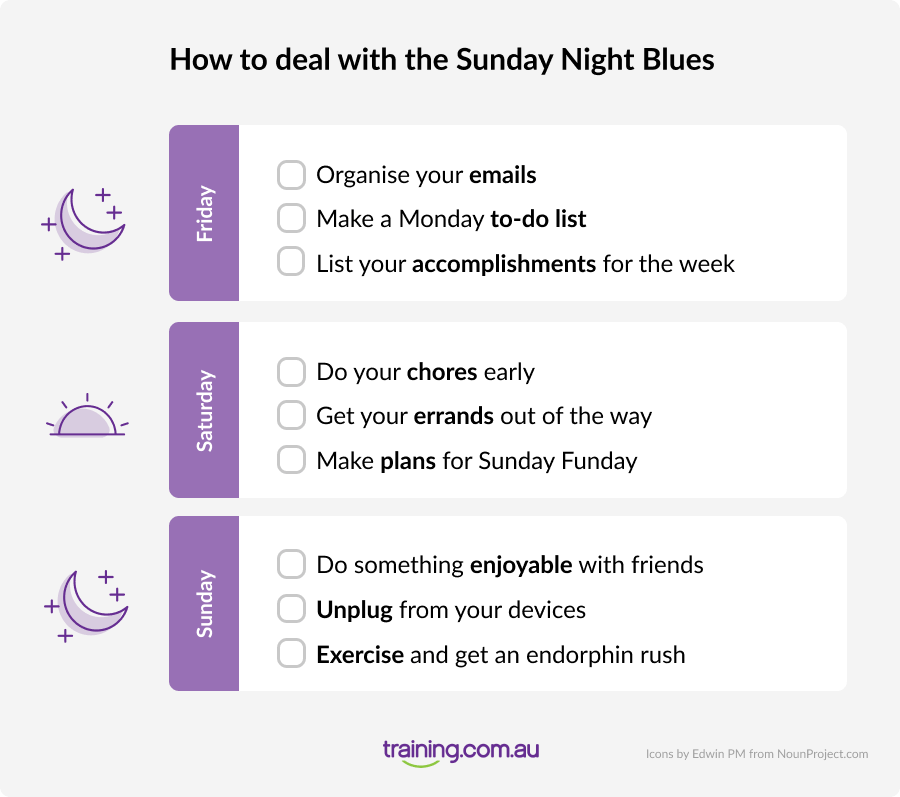In this post
Sunday Night Blues: Why You Feel So Sad & How to Fix It

Why you do get the Sunday Blues, and what can you do about them?
Here’s what you need to know about why they happen, how to deal with them – and why it might be a sign you need a bigger change.
“I hate Sundays. Why do I feel so sad?”
It’s 5 pm, and you have a case of the Sunday Blues.
What was once an expansive weekend full of promise has come to a cruel end. The shadow of Monday looms over your last bit of freedom, ruining any chance you had at relaxation.
What are the Sunday Night Blues?
The Sunday Night Blues is a feeling of dread, anxiety, and sadness that comes over you on Sunday afternoon or evening. It is also known as Sunday Night Depression, and psychologists tend classify it at “situational depression”, or a depression that happens as a reaction to your circumstances and goes away when the circumstances do.
Whatever you call it, it’s a real thing. 78% of people get it, according to a Monster poll, and of the Sunday sufferers, 62% get it “really bad”.

Why Sunday night?
There can be a few reasons for the Sunday Night Blues. Because it comes with the realisation that the weekend is coming to a close, you could be:
- Scrambling to finish your tasks and chores for the week.
- Regretting the way you spent your time, or wishing you’d done more.
- Dreading the pressures of the next five days, thinking about all the unpleasant parts of the workweek to come.

Richard Williamson realised that, after 15 years in marketing, he couldn’t enjoy Sundays anymore because he dreaded Monday. “It got to the point where I started to feel down on Saturdays, too, knowing that Monday was just one day away. I changed careers, going completely a different direction: law enforcement. That lasted 8 years until I was injured on duty and had to return to an office environment.” Now, he’s a VP of Marketing by day, and he also consults and coaches people transitioning from a career to a business startup or going into entrepreneurship.
More than just the blues
For some, it can be a crippling situation with mental health implications. When Lexie Graff’s role as a hygiene assistant at a dental practice changed, it started affecting the rest of her life.
“I got to a point where I was very depressed and my Sunday blues were extreme.
One night my husband and I were watching TV and I just got up and went to the kitchen. I sat down at the table and just started crying.”

She’s now a certified life coach with her own business, Make the Uncomfortable Comfortable, and says she wishes she’d made a change sooner.
While it can be fixed, it’s important to recognise how it’s affecting you. The Sunday Blues is a very real thing and one that can have a long-term effect on your life.
Easy fixes to try from Friday to Monday
The good news is that there are some simple ways to fix the Sunday Night Blues if it’s caused by your habits or schedule, and not a symptom of something deeper.
And if they don’t, you know you’ve tried the most general suggestions around, and that it might be time to make a more serious change.

Friday afternoon
There are a few things that, if you knock them out on Friday afternoon before you leave, can clear some mental space over the weekend and allow you to relax.
Organise your emails
Clean out your email inbox so it’s ready to go on Monday. Respond with a quick “Thanks!” or “Got it!” to anything that needs acknowledgment. Flag any emails that need attention when you get in.
List your accomplishments
Summarise what you’ve achieved during the week. This can help you to feel a sense of achievement and closure after you’ve finished work so you’re not just thinking about the next thing you need to do.
Plan Monday's tasks
Plan 3-5 tasks for the next day you’re in, so you’ll be ready to dive in and you won’t mull over what you need to do over the weekend.
Saturday morning
Set yourself up for the weekend on Saturday morning so you can enjoy the rest of your time off.
Get your chores and errands out of the way
Do your chores early in the weekend instead of leaving them for later. Your naturally higher mood on Saturday will make it easier to get through your weekly to-do list, whether that’s grocery shopping, cooking for the week, balancing your budget, or doing the cleaning.
Make Sunday Funday plans
Plan something fun for Sunday night so you have something to look forward to. Bonus points if it involves other people! Depending on your tastes and budget, you could book tickets for a movie, plan to cook a fancy dinner, invite friends for a weekly pizza catch-up, or schedule a sunset walk with a friend.
Sunday evening
Try thinking of Sunday night as just another night in your life, rather than the end of the weekend or the start of the next week. This means recognising that not everything has to be done tonight and that you can space some of the dull or stressful tasks out over the week. If you start to feel down, try these strategies:
Distract yourself
It may sound silly, but just distracting yourself with something pleasant, like a favourite hobby, a phone call with a friend, or a good book, can snap you out of a negative thought spiral.
Write it down
Plan something fun for Sunday night so you have something to look forward to. Bonus points if it involves other people! Depending on your tastes and budget, you could book tickets for a movie, plan to cook a fancy dinner, invite friends for a weekly pizza catch-up, or schedule a sunset walk with a friend.
Unplug
Take some time away from your devices! This will help you to stop thinking about work if you regularly get work-related notifications.
Exercise
It’s proven to reduce anxiety and depression, and it replaces angst with endorphins!
Digging deeper: the need to achieve
Give yourself permission to have time out. It can help to recognise that our lives are busier and more demanding than they’ve ever been before. So if you’ve been putting pressure on yourself to be productive, recognise that.
This can be a particular problem for high-achievers who are never satisfied with what they’ve done.
“Your continual drive to move forward without examining the direction where you’re going or looking in is eating up your life and costing you opportunities,” says Kelly Diciero, a stress management coach, meditation, and yoga teacher.

“Even though, deep down, you feel like you’re denying an even deeper desire that you’re not quite aware of. You’re going after achievements that you don’t even want.”
She emphasises that a lack of connection with yourself, and what you really want, can show up as Sunday Blues, but also other kinds of seemingly random health issues “like digestive issues, food intolerances, insomnia, rashes or skin disorders.”
Is it actually a symptom of something bigger?
If you’re suffering from Sunday night anxiety because you’re dreading Monday morning, then no matter what you do, it won’t go away. You’ve tried all the recommended methods, but it’s starting to feel like treating the symptoms and ignoring the cause.
Igor Mitic, co-founder of Fortunly.com, says that while Sundays are tough for everyone, there’s a difference between the usual blues and ones that signal you need a bigger change. “If you feel lazy and less motivated to prepare yourself for work, then your Sunday Blues is telling you that you need a career change,” he says.
A bad boss can also be a big cause of the Sunday Blues. Richard Williamson says “90% of the people I work with are building their own companies not because they get Sunday Blues due to their careers, but rather because of their bosses.” A bad boss isn’t all bad, though – it might mean a change of companies, essentially keeping the same job.
Jess English, now a Registered Dietitian and founder of Level Up Nutrition in the UK, says she knew things weren’t sitting right in her job as Cabin Crew ten years ago. Even though “crew basically don’t have Sundays,” she found herself with the nagging feeling that she didn’t want to be in the same position in a few years – or even months. Her best advice? “It’s never too early to start looking around.” If you’re suffering from chronic Sunday Night Blues, she urges you to “do your research, pester people for information about their roles (the worst they can do is not reply!), volunteer if you can, email and dig to find out what exactly would be involved in making the change.”
Q: So what should you do if you’re stuck in a rut, or a dead-end job?
A: Block out at least a couple of hours on Sunday afternoon to work on making a change. Maybe you’d like to upskill with some micro-credentials, or you need some resume and cover letter templates.
And what if the Sunday Blues isn’t just on Sundays anymore?
“Feeling sad that the weekend is over is very different from being so consumed with the ‘blues’ to the point that it leaks into your whole week,” says Caleb Backe, a Certified Life Coach and Business Consultant for Maple Holistics. “Being stressed and bitter is an unhealthy state of being, and if it’s work-related then it might be a sign that you need to rethink your career.”

Sunday Blues getting you down? Looking for a change of track?
It’s time to put your study goals first.
Here's WhyLatest Articles
How to Apply for Work Placement: Tips & Resources
Congratulations! You’re about to embark on an exciting journey where you will practise and develop t...
11 Hobbies That Can Make You Money: Use Your Passion for Profit
Hobbies often get a bad rap. They’re seen as just a way to kill time, a mindless escape from t...
Is The Job You Hate Killing You? Why You Need to Make a Change
Do you hate your job? Studies show that staying in a job you hate has negative health effects and ev...
Want to read more?
Administration Cover Letter Example
A sample cover letter for an administration position, with tips and tricks on how to stand out from...
Making a Career Change as an Older Adult: The Complete Guide
What can you do when career unhappiness is niggling at the back of your mind? As an older adult, you...
Will a Democratic Leadership Style Make You a Successful Leader?
Find out what strengths and characteristics make the democratic leader a powerful force in the moder...
